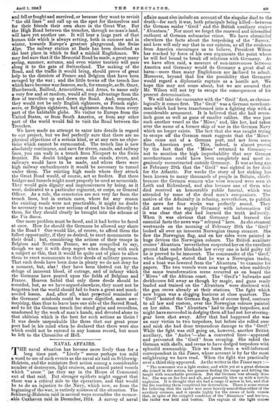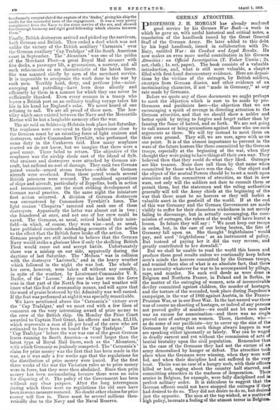NAVAL AFFAIRS. T HE naval situation has become more lively than
for a long time past. " Lively " seems perhaps too mild a word to use of such events as the naval air raid on Schleswig- Holstein, and the miniature fleet action among a considerable number of destroyers, light cruisers, and armed patrol vessels which " arose " (as they say in the House of Commons) out of that raid. But stronger epithets might suggest that , there was a critical side to the operations, and that would be to do an injustice to the Navy, which now, as from the beginning of the war, is entirely mistress of the situation. The Schleawig-Helstein, raid in several ways resembles the memor- able Cuxhaven raid in December, 1914. A -survey of naval affairs must also include an account of the singular duel to the death—for such it was, both principals being killed—between the German raider 'Greif' and the British auxiliary cruiser Alcantara.' Nor must we forget the renewed and intensified outburst of German submarine crime. We have chronicled elsewhere the facts about the torpedoing of the Sussex,' and here will only say that in our opinion, as all the evidence from America encourages us to believe, President Wilson has reached by force of his own arguments the point where he will feel bound to break off relations with Germany. As we have often said, a measure of non-intercourse between America and Germany would do Germany a great deal Of harm—more than many Englishmen are inclined to admit. Moreover, beyond that lies the possibility that Germany would regard a diplomatic rupture as a hostile act. We hope this may not come about, but we are assured that Mr. Wilson will not try to escape the consequences of hie present determination.
We will take the encounter with the' Greif ' first, as chrono- logically it comes first. The Greif' was a German merchant- man which had been transformed into a fighting ship with -a considerable armament. It is believed that she had seven- inch guns as well as guns of smaller calibre. She was just such another vessel as the Mowe,' and, like her, had taken over the name of a former ship of war in the German Navy which no longer exists. The fact that she was caught trying to escape off e the German coast suggests that the Mowe also came out of a German port, and not from some South American port. This, indeed, is almost proved by the fact that the ' Mowe ' returned to Germany— not to mention the high improbability that any German merchantman could have been completely and most in- geniously reconstructed outside Germany. It was as long ago as February 29th that the 'Greif' was sighted in her dash for the Atlantic. For weeks the story of her sinking has been known to many thousands of people in Britain, chiefly because the German seamen who were rescued were seen at Leith and Birkenhead, and also because one of them who died received an honourable public funeral, which was attended by some of the dead man's companions. The motive of the Admiralty in refusing, nevertheless, to publish the news for four weeks was perfectly sound. They did not want to supply Germany with information till it was clear that she had learned the truth indirectly. When it was obvious that Germany had learned ' the essential facts the news was" released " here. As she steamed westwards on the morning of February 29th the Greif' looked all over an innocent Norwegian tramp steamer. She flew the Norwegian flag, and on her sides were painted in huge devices the Norwegian colours. The British auxiliary cruiser Alcantara 'nevertheless suspected her ofi the excellent ground that under blockade law every one is held guilty till he is proved to be innocent. The commander of the Greif,' when challenged, stated that he was a Norwegian trader, and a boat was lowered from the Alcantara ' to examine his papers. The two vessels were near together, when suddenly the same transformation scene occurred as on board the Mow° ' off the African coast. The Greif's ' bulwarks and deckhouses fell away as though by mag,ic, and guns ready loaded and trained on the Alcantara ' were disclosed with the gun crews already at their stations. The fight which now began was a slogging business at close quarters. The 'Greif' hoisted the German flag, but of course fired, contrary to all law and custom over the Norwegian colours painted on her sides. The Alcantara ' had 0 dodge torpedoes, and might have succeeded in dodging them all had not her steering- gear been shot away. After that had happened she was an easy victim to two torpedoes but before she rolled over and sank she had done tremendous damage to the Greif:* While the fight was still going on, however, another British auxiliary, the Andes '—also a converted liner—appeared and prevented the Greif' from escaping. She raked the German with shells, and seems to have /dodged torpedoes with splendid seamanship. This we learn from a well-informed correspondent in the Times, whose account is by far the most enlightening we have read. When the fight was practically over a third ship appeared. As the writer in the Times says :— "The newcomer was a light cruiser, and while yet at a great distance , she joined in the action, her gunners finding the range and hitting the target with remarkable precision. But the German was already done for. She was on fire fore and aft, and presently blew up with a terrific explcsion. It is thought that she had a cargo of mines in her, and that the fire reaching them completed her destruction. There is some reason for believing that the raider was more heavily armed than either of the auxiliary cruisers, and it speaks highly for the crews of both vessel. that, in spite of the crippled condition of the ' Alcantara ' and her loss, the raider was held and beaten. The captain of the light cruises
handsomely congratulated the captain of the 'Andes,' giving his ship the credit for the successful issue of the engagement. It was a very pretty compliment from the Navy to the sister service of the sea, and showed the thorough harmony and right good fellowship which obtains between them."
Finally, British destroyers arrived and picked up the survivors, both German and British. Thus ended a duel which was not unlike the victory of the British auxiliary Carmania ' over the German auxiliary Cap Trafalgar ' off the South American coast in September. The Alcantara ' was one of the prides of the Merchant Fleet—a great Royal Mail steamer with five decks, a passenger lift, a gymnasium, a nursery, and all such refinements as are characteristic of the latest liners. She was manned chiefly by men of the merchant service. It is impossible to overpraise the work done in the war by such men. Terribly hard, dirty, and perilous jobs—mine- sweeping and patrolling—have been done silently and efficiently by them in a manner for which they can never be sufficiently thanked. Even every seaman in a tramp who leaves a British port on an ordinary trading voyage takes his life in his hand for England's sake. We never heard of one refusing to sail. We are all proud of these men. The hos- tility which once existed between the Navy and the Mercantile Marine will be but a laughable memory after the war.
The air raid on Schleswig-Holstein took place last Saturday. The seaplanes were convoyed to their rendezvous close to the German coast by an escorting force of light cruisers and destroyers, under Commodore Tyrwhitt, who performed the same duty in the Cuxhaven raid. How many seaplanes started we do not know, but we imagine that there were a good many. Three failed to return. The objective of the seaplanes was the airship sheds east of the island of Sylt. Our cruisers and destroyers were attacked by German air- craft, but suffered no sort of damage. They sank two German patrol vessels—armed steam trawlers—while the German aircraft were overhead. From these patrol vessels several British prisoners were rescued. The combined operations of ships and aircraft, particularly of Zeppelins, both in action and reconnaissance, are the most striking development of German naval practice. On the same night the miniature fleet action occurred. A division of German destroyers was encountered by Commodore Tyrwhitt's force. The light cruiser 'Cleopatra' rammed and sank one of these destroyers. Apparently the latter was almost cut in two ; she foundered at once, and not one of her crew could be saved. The Germans, as usual, retired behind their mine- field—in which, of course, they were wise—and, as usual, have published curiously misleading accounts of the action to the effect that the British force broke off the action. The German people are still invited to believe that the German Navy would strike a glorious blow if only the skulking British Fleet would come out and accept battle. Unfortunately there was a mishap on our side, apparently during the daytime of last Saturday. The 'Medusa' was in collision with the destroyer Laverock,' and in the heavy weather which followed in the night she was lost. The whole of her crew, however, were taken off without any casualty, in spite of the weather, by Lieutenant-Commander V. S. Butler, of the 'Lassoc.' Any one who has seen the fierce seas in that part of the North Sea in very bad weather will know what this feat of seamanship means, and will agree that the word of praise bestowed by the Admiralty was well earned. If the feat was performed at night it was specially remarkable.
We have mentioned above the Carmania's ' victory over the Cap Trafalgar,' and we must end with a few lines of comment on the very interesting award of prize mcney to the crew of the British ship. On Monday the Prize Court awarded to Captain Noel Grant, his officers and men, £2,115, which represents a sum of 15 per head of the crew who are estimated to have been on board the Cap Trafalgar.' The Cap Trafalgar' before the war was one of the great German liners running to South America—a vessel larger than the latest type of Royal Mail liners, such as the Alcantara,' with which Germany so jealously competed. The Carmania's ' claim for prize money was the first that has been made in the war, as it was only a few weeks ago that the regulations for the distribution of prize money were issued. For the first three weeks of the war the Victorian rules as to prize money were in force, but they were then abolished. Since then prize money has been accumulating because there were no rules for disposing of it. The policy of the Government has been without any clear purpose. After the long interregnum during which there were no regulations the old ones have been in some measure restored. NO doubt other claims for prize money will flow in. There must be several millions theo- retically due to the Navy and the Naval Reserve.































 Previous page
Previous page